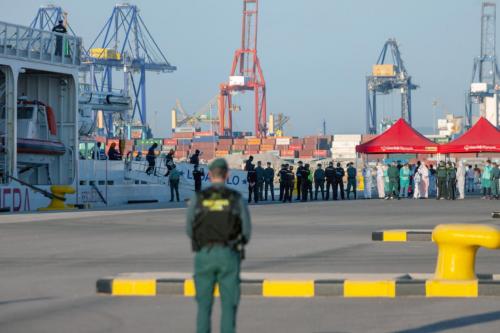Mediterranean crossings deadlier than ever, new UNHCR report shows
Three years on from the shocking images of lifeless Syrian toddler Alan Kurdi on a Turkish beach, a new report by UNHCR, the UN Refugee Agency shows that crossing the Mediterranean Sea has become even more deadly.

The first migrants from the Aquarius ship arrive at the port of Valencia on an Italian ship, the Dattilo, June 2018.
UNHCR’s new Desperate Journeys report shows that more than 1,600 people have died or gone missing while attempting to reach Europe so far this year.
The report shows that while the total number of people arriving in Europe has fallen, the rate of deaths has risen sharply, particularly for those crossing via the Mediterranean Sea. In the Central Mediterranean, one person died or went missing for every 18 people who crossed to Europe between January and July 2018, compared to one death for every 42 people who crossed in the same period in 2017.
“This report once again confirms the Mediterranean as one of the world’s deadliest sea crossings,” said UNHCR’s Director of the Bureau for Europe, Pascale Moreau. “With the number of people arriving on European shores falling, this is no longer a test of whether Europe can manage the numbers, but whether Europe can muster the humanity to save lives.”
In recent months, UNHCR, together with the UN Migration Agency, IOM, has called for a predictable, regional approach for the rescue and disembarkation of people in distress in the Mediterranean Sea.
UNHCR is also calling on Europe to increase access to safe and legal pathways for refugees, including by increasing resettlement places and removing obstacles to family reunification – helping to provide alternatives to potentially deadly journeys.
The report also outlines the dangers refugees face while traveling along land routes to or within Europe. Noting the steps that some have taken to prevent refugees and migrants from accessing their territory, the report urges States to grant those seeking international protection readily-available access to asylum procedures. It also appeals to States to strengthen mechanisms to protect children traveling alone and seeking asylum.
Best-selling author UNHCR Goodwill Ambassador Khaled Hosseini, himself a former refugee from Afghanistan, has published a new illustrated book, coinciding with the three-year anniversary of Kurdi’s death. ‘Sea Prayer’ is dedicated to the thousands of refugees who have perished around the world while fleeing war, violence and persecution.
“When I saw those devastating images of the body of Alan Kurdi, my heart shattered,” said Hosseini. “Yet, just three years on and despite thousands more people losing their lives at sea, our collective memory and urgency to do better seems to have faded.”
In June and July 2018, Hosseini visited Lebanon and Italy and saw the devastating impact on families who have lost relatives while attempting to reach Europe.
“In Sicily I visited a lonely, unkempt cemetery full of unmarked graves of people – including many children – who have drowned on journeys just like Alan’s in the past years,” said Hosseini. “Each one of those people is now reduced to just a number, a code on a grave, but they were all men, women and children who dared to dream of a brighter future. Three years on from Alan’s death, it’s time we came together to do more to prevent future tragedies and let our friends, families, communities and governments know that we stand with refugees.”
Source: United Nations High Commissioner for Refugees
- 260 reads
Human Rights
Fostering a More Humane World: The 28th Eurasian Economic Summi

Conscience, Hope, and Action: Keys to Global Peace and Sustainability

Ringing FOWPAL’s Peace Bell for the World:Nobel Peace Prize Laureates’ Visions and Actions

Protecting the World’s Cultural Diversity for a Sustainable Future

Puppet Show I International Friendship Day 2020

